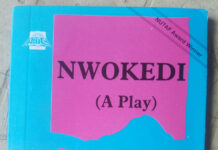📢 Follow our WhatsApp Channel for the latest literary updates!
The Blood of a Stranger by Dele Charley is a simple, yet symbolic play. Simple because the diction is easy to comprehend. Symbolic because it pictures in clearer terms the colonialist exploitation of the African continent by its colonial slave masters.
In the play, Mr Whitehead and his subordinate, Parker represent the surging white force that colonised Africa and exploited its vast natural resources. Likewise, Maligu and Soko project the white man’s African collaborators who betrayed their people out of their own selfish interests and love for money.
Set in Mandoland, the play begins at the sacred grove where Soko supposedly stays. Soko is the chief priest of Mandoland and the link between the gods and the people. He is paid a visit by Maligu who is the chief adviser to the king. Maligu is learned, and can read and write.
Maligu intimates Soko of a letter in his possession. The letter, according to him, is supposedly from Maligu’s brother living in the city. The letter announces the coming of a stranger and the accompaniment of good fortunes. The stranger, a white man has the intent of farming tobacco in Mandoland. As it stands, Mandoland has not received any stranger on its soil since it ended wars with its neighbours. So, it seems a little bit difficult to convince the people to accept the white stranger into their midst.
Maligu co-opts Soko to cook up a false prophecy that foretells the coming of a stranger. This is to make it seem as if this act is the will of the gods.
At first, Soko does not oblige. What Maligu has suggested contravenes the long-standing customs and traditions of the land. Then, Maligu threatens him with Soko’s little secret of not sleeping in the grove when the tradition states otherwise. Maligu also tortures him psychologically with his pauperism (Soko feeds on the sacrifices offered to the gods) and his inability to father a male child. Eventually, Soko budges to Maligu’s plan and agrees to call the people and tell them of the impending visit.
Then, we encounter the characters of Kindo and Wara. Kindo is the chief warrior of the village and the heir apparent to the throne of Mandoland. Wara is his woman. Kindo brings Wara late in the night within the eyeshot of the shrine for their privacy. He even intends to take her in. Wara, in fear, protests against being taken further towards the sacred cave.
Kindo attempts to dispell her fears. But Wara refuses to yield to Kindo’s words. Kindo tells her of the suspicion he has of Soko and Maligu and that the two are up to no good. He admits that he can read just like Maligu. He is premonitory. He feels that something bad is going to happen. He asserts the fact that Soko never sleeps in the cave.
However, there is a movement in the cave. To their utter amazement, Soko comes out with a gong in hand. Kindo drags Wara into a hiding to avoid being discovered. Soko summons the people with the beats of a drum.
In the following scene, Soko, accompanied by his attendants, delivers “a stranger is coming” prophecy to the people. The king, Santigi, in attendance with his chief adviser, Maligu and the chief warrior, Kindo, Soko goes beyond what Maligu told him to do. He claims the gods require a virgin sacrifice to cleanse the land and ensure peace reigns.
Everyone, except Kindo, accepts the words of Soko. The reason for this is not far-fetched. Soko is the channel between the gods and the people. He is their message bearer; the mouth of the gods. Everything he speaks is sacred and supposedly believed to be gods’ words. This belief is what Soko exploits.
Only Kindo questions Soko’s statement and its logicality. This, Maligu ties down to questioning the gods. Kindo does not believe an iota of Soko’s prophecy but the king does and everyone else. There is a cold enmity between Kindo and Soko all through the ritual procession.
Soon after, King Santigi begins to order his subordinates around. Kindo to ensure security. Soko to perform the necessary rites to ensure peace. Maligu takes his initiative and informs them of the letter he received and ultimately, the coming stranger, a white farmer.
Kindo becomes suspicious. He notices some foul play and could not but call the attention of the people to this.
When his efforts yield nothing, Kindo leaves and Wara joins him. The duo discuss their future. Kindo as the ‘Santigi Mando the Sixth’ and Wara, his queen. Kindo confides in Wara the calamitous events he felt may happen in not too distant future. Here, foreshadowing literary technique is employed.
Kindo opens up on Wara’s lineage. Wara is considered a stranger in Mandoland because of her mother. Although her father was a native of the land, her mother was a slave (from other parts).
Then, in the following Act, the anticipated white man, Mr Whitehead, comes into the village with his right-hand man, Parker (a black man). During his first two days in the village, he refuses to pay obeisances to the king. This is a direct insult on first, the royalty and then, the customs and traditions of Mandoland. Kindo could not stomach this insult. He orders the palace guards (Boko and Sima) to go and bring the strangers from where they lodge. Both Maligu and Soko try to prevail on King Santigi to restrain Kindo from doing this.
However, King Santigi decides not to intervene and leaves for the shrine. Santigi is particularly irritated with the way Maligu and Soko make excuses for Mr Whitehead whom they are supposed to sanction as upholders of the custom.
Mr Whitehead is brought into the palace sleeping on a stool, Parker, his right-hand man protesting. Kindo demands for an explanation from Parker on why the white man has not paid respects to the throne of Mando. He punishes Parker, the African for not adhering to the custom. He orders he should be whipped forty-two times; his age number. Parker wakes Mr Whitehead in fright.
Kindo serves Mr Whitehead his punishment as well. He makes the white man prostrate, kiss the ground and pay the homage he ought to have paid to the king. This angers the white man. He would later transfer his aggression on Maligu whom he believes has failed to ‘take care of Kindo’.
In following events, Mr Whitehead buys strong alcoholic drinks, tobacco and gin for the villagers. He does this with the intent to perpetuate his secret plan. While intoxicated, the villagers begin to misbehave. They do all sorts of untoward things. They run around naked. They go as far as copulating in public places.
Kindo goes to the white man and accuses him of bringing evil to the community. He questions Mr Whitehead’s motive for coming to the village. Thereafter, he goes in search of his woman, Wara.
Mr Whitehead attempts to rape Wara. Wara is brought to him blindfolded by Maligu and Soko. However, Wara escapes after she bites Mr Whitehead. In order for her not divulge this atrocious deed to Kindo, Soko tells her she’s the virgin the gods have chosen for their sacrifice. He tells her to leave the village immediately. Wara thanks him and runs for her dear life.
At this point, Soko chickens out because of the dangers Mr Whitehead courts. He wants out of their evil plans. Mr Whitehead won’t have any of these. He plans to take Soko and Kindo out of the way so he could launch fully into mining diamonds which is his real motive for coming to the village.
Having enquired from his trusted collaborator, Maligu and the unsuspecting King Santigi, he arms himself with the necessary information about the customs of Mandoland. For example, if any one kills during peacetime, such person would be banished.
In a kind of way, Mr Whitehead kills two birds with a stone. He instructs Parker to kill Soko. Kindo too kills Parker for killing Soko.
Right in the palace, a ritual procession is going on; the sacrifice of a virgin stranger. Unknown to the king, the hooded priest in charge is Maligu (not Soko) and the blood sacrificed is that of Parker (not a girl or virgin stranger).
Kindo comes around and bares the secrets. The killing of Soko and Parker. The false sacrifice. The evil plans of Mr Whitehead and Maligu and their intent to exploit the village of hitherto unknown diamonds.
Both Whitehead and Maligu call for the banishment of Kindo. Kindo has killed during peacetime. Unfortunately, the king complies. Santigi V banishes Kindo. Before he leaves, Kindo resolves to kill Mr Whitehead. Kindo acts on his position as the chief warrior to prevent the king or anyone from interfering in the homicide.
The white man seeks Maligu’s help. Instead, Maligu betrays him. Mr Whitehead impales himself upon the spear in Kindo’s hands and dies.
Whitehead: My lord, you must stop them. Maligu, you must stop him! He is mad!
Maligu: I cannot stop him, Whitehead. I am sorry. Thank you for the diamonds.
Whitehead: You are a man of evil. You are greedy. . . .
Culled out of Dele Charley’s THE BLOOD OF A STRANGER.
Kindo goes into exile with his warriors; promising to come back for the crown after his father’s death. King Santigi disowns him and is left with Maligu, the chronic betrayer.
Join Our Social Media Channels:
- WhatsApp: Literature PADI
- Telegram: Literature PADI
- YouTube: @literaturepadi
- Facebook: Literature PADI











Love it so much